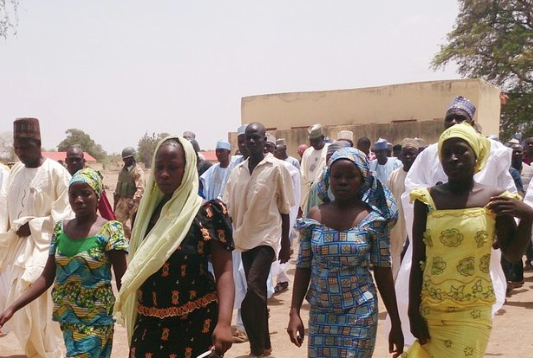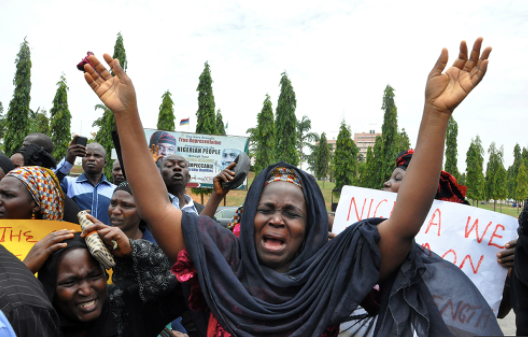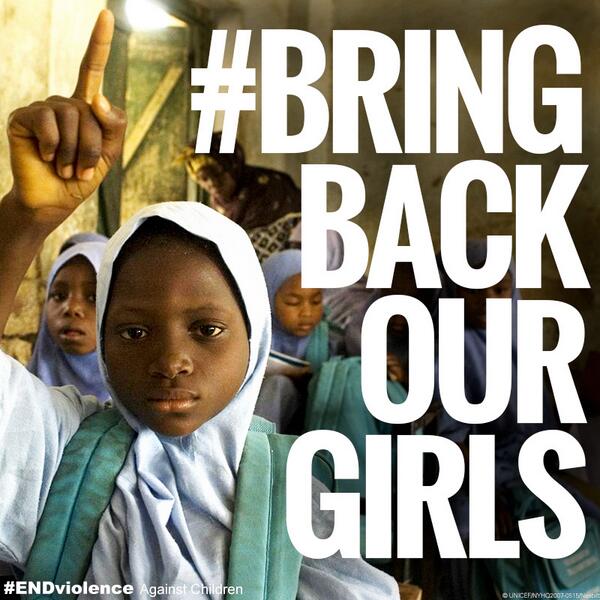In a part of Nigeria where 72% of the population never attends elementary school, they were were in high school. In a country where a war is being waged to oppress women from getting an education, they had left their homes and families to pursue one, living in a boarding home because for many, there was not a good school in their local village. They had aspirations. They had goals. They wanted to be teachers, doctors, lawyers. In the small farming town of Chibok, hundreds of girls were doing the hard work of pursuing dreams that were not easy given their circumstances, which were growing more tenuous every day. Schools around them were shutting down because of the violence of a radical and violent Muslim insurgence group bent on shutting down secular education at any cost. Recently, they massacred fifty-nine schoolboys in a nearby town. Attending school in this part of the country was a dangerous act. But the school in Chibok, and the girls, persevered. On the night of April 14th, many girls had just completed their physics exam and were sleeping in their dorms when a group of men, disguised in military gear, pulled them out of bed. They were told they would be taken to safety. As they were driven away in trucks, the men set fire to the school and began shooting guns into the air. It became clear that they were not being protected, but were in fact being kidnapped by the group they feared most. Boko Haram has been waging a war of terror in Nigeria for five years, specifically taking aim at Western education. Their name loosely translates to “Western education is sin.” The group has killed at least 2,300 people since 2010. Much like Joseph Kony in Uganda, their reign of terror relies on extreme violence, including bombings, massacres, and kidnappings. They hide in the bush and rely on fear and violence to evade capture.  [photo source] It’s hard to imagine what it would be like to discover that a community’s brightest young girls, aged 16-18, vanished into the night. The only answers to the myriad of questions have come from the brave girls who escaped. Since the mass kidnapping, approximately 40 girls risked their lives to escape the clutches of Boko Haram. Some jumped out of moving vehicles. Some ran away at night. Some snuck away while on errands to fetch water. They survived and walked back to their village. But well over 200 girls remain missing, and their families grow distraught as weeks have passed with little news and unclear action from their government. There is concern that rescue attempts could result in violence towards the girls. This happened during a previous attempted rescue of two European engineers kidnapped by Boko Haram. The town of Chibok also remains a difficult place to send help . . . the nearby airport has shut down and the road into town is extremely dangerous. One soldier reports that every rescue attempt has resulted in an ambush. He worries that Boko Haram is being tipped off to their movements.
[photo source] It’s hard to imagine what it would be like to discover that a community’s brightest young girls, aged 16-18, vanished into the night. The only answers to the myriad of questions have come from the brave girls who escaped. Since the mass kidnapping, approximately 40 girls risked their lives to escape the clutches of Boko Haram. Some jumped out of moving vehicles. Some ran away at night. Some snuck away while on errands to fetch water. They survived and walked back to their village. But well over 200 girls remain missing, and their families grow distraught as weeks have passed with little news and unclear action from their government. There is concern that rescue attempts could result in violence towards the girls. This happened during a previous attempted rescue of two European engineers kidnapped by Boko Haram. The town of Chibok also remains a difficult place to send help . . . the nearby airport has shut down and the road into town is extremely dangerous. One soldier reports that every rescue attempt has resulted in an ambush. He worries that Boko Haram is being tipped off to their movements.  photo of escaped girls by Haruna Umar/AP Parents, uncles, and cousins have taken matters into their own hands, searching in groups for the girls on their own. One such group reported news that devastated the waiting families: the girls were being sold off as “brides” in a mass wedding. This morning, a video from someone claiming to be the leader of Boko Haram confirmed these fears. “I abducted your girls. I will sell them in the market, by Allah,” he said. “There is a market for selling humans. Allah says I should sell. He commands me to sell . . . . Girls, you should go and get married.”
photo of escaped girls by Haruna Umar/AP Parents, uncles, and cousins have taken matters into their own hands, searching in groups for the girls on their own. One such group reported news that devastated the waiting families: the girls were being sold off as “brides” in a mass wedding. This morning, a video from someone claiming to be the leader of Boko Haram confirmed these fears. “I abducted your girls. I will sell them in the market, by Allah,” he said. “There is a market for selling humans. Allah says I should sell. He commands me to sell . . . . Girls, you should go and get married.”  Make no mistake: if this threat is achieved, these girls are not brides. They are not wives. We should refuse this language because it waters down the violence of being kidnapped and held against your will. They are trafficked children. If they are being forced into sexual relationships through unwanted marriage, they are sex slaves. Their bright futures have been traded for a life of slavery if they are not rescued. This is a devastating story . . . it’s a nightmare for any parent to imagine this reality. And yet, despite it happening over two weeks ago, there has been very little news coverage of the story. I didn’t even hear about it until April 30th, and that was from a hashtag on twitter. I turned on CNN that evening, hoping to learn more, and watched an entire hour of news coverage without a single mention of this story. There was, however, continued coverage of the search for a missing flight. The world has spent weeks discussing that flight, and thousands upon thousands of dollars on searching for that black box, despite the fact that it is very unlikely there are any survivors. However, the situation in Nigeria involves children who could be rescued and families who could be restored. Why is this not being covered? Why isn’t this the top story? Many people have been asking these questions, and the answers are unsettling. I was at a conference this weekend where a major news channel was present, and a couple of us marched into their room asking for answers. The answer we got: it’s not what people want to watch. They want trials, mysteries to be solved, explosions, startling first-hand accounts, people they relate to . . . and this story doesn’t resonate. CNN finally spoke up about the story’s lack of coverage, and anchor Brian Stelter suggested that it isn’t being covered because there are no photos or first-hand accounts. Journalists can’t travel to that area, and families are reluctant to be film for fear of retaliation or violence towards their missing daughters. That may be true, but many (myself included) fear there is a more troubling reason for the lack of coverage: these are African girls. I feel certain that a group of American or European girls, sleeping at a boarding school and stolen by armed men in the middle of the night, would absolutely be the top story. But African girls are Other. The distance, the difference, the ongoing challenge on the continent . . . have these things made us discount their humanity? Are we failing to identify with these parents because of racial or cultural differences? I hope that isn’t true. I fear that it is. Nigerian locals have been speaking up, protesting and asking for the world to take notice, acknowledging that it may be social media efforts that get the media to finally take notice and offer coverage. So far, this has proven true. It was a tweet from my friend Heather that set a recent CNN story into motion. And news outlets, while failing to cover the actual abductions, have been covering the protests happening all over the world. So what can we do to help these girls? We can amplify their story. We can tell the world, and the people who control the flow of information, that we care. We can ask the news outlets for coverage. We can post and repost stories that explain the situation to the many people who have no idea this is happening. We can use the hasthag #bringbackourgirls which is gaining media attention. And we can tell our government that we want their commitment to help. (Sign the White House petition here.) We don’t need photos of the girls or interviews with the parents to prompt us to care . . . we just need our humanity. We need to see these girls as daughters, sisters, nieces, and friends. We need to imagine this happening in our own community. And we need to get beyond the idea that girls half-way around the world are not significant to our own interests. Girls matter. Everywhere.
Make no mistake: if this threat is achieved, these girls are not brides. They are not wives. We should refuse this language because it waters down the violence of being kidnapped and held against your will. They are trafficked children. If they are being forced into sexual relationships through unwanted marriage, they are sex slaves. Their bright futures have been traded for a life of slavery if they are not rescued. This is a devastating story . . . it’s a nightmare for any parent to imagine this reality. And yet, despite it happening over two weeks ago, there has been very little news coverage of the story. I didn’t even hear about it until April 30th, and that was from a hashtag on twitter. I turned on CNN that evening, hoping to learn more, and watched an entire hour of news coverage without a single mention of this story. There was, however, continued coverage of the search for a missing flight. The world has spent weeks discussing that flight, and thousands upon thousands of dollars on searching for that black box, despite the fact that it is very unlikely there are any survivors. However, the situation in Nigeria involves children who could be rescued and families who could be restored. Why is this not being covered? Why isn’t this the top story? Many people have been asking these questions, and the answers are unsettling. I was at a conference this weekend where a major news channel was present, and a couple of us marched into their room asking for answers. The answer we got: it’s not what people want to watch. They want trials, mysteries to be solved, explosions, startling first-hand accounts, people they relate to . . . and this story doesn’t resonate. CNN finally spoke up about the story’s lack of coverage, and anchor Brian Stelter suggested that it isn’t being covered because there are no photos or first-hand accounts. Journalists can’t travel to that area, and families are reluctant to be film for fear of retaliation or violence towards their missing daughters. That may be true, but many (myself included) fear there is a more troubling reason for the lack of coverage: these are African girls. I feel certain that a group of American or European girls, sleeping at a boarding school and stolen by armed men in the middle of the night, would absolutely be the top story. But African girls are Other. The distance, the difference, the ongoing challenge on the continent . . . have these things made us discount their humanity? Are we failing to identify with these parents because of racial or cultural differences? I hope that isn’t true. I fear that it is. Nigerian locals have been speaking up, protesting and asking for the world to take notice, acknowledging that it may be social media efforts that get the media to finally take notice and offer coverage. So far, this has proven true. It was a tweet from my friend Heather that set a recent CNN story into motion. And news outlets, while failing to cover the actual abductions, have been covering the protests happening all over the world. So what can we do to help these girls? We can amplify their story. We can tell the world, and the people who control the flow of information, that we care. We can ask the news outlets for coverage. We can post and repost stories that explain the situation to the many people who have no idea this is happening. We can use the hasthag #bringbackourgirls which is gaining media attention. And we can tell our government that we want their commitment to help. (Sign the White House petition here.) We don’t need photos of the girls or interviews with the parents to prompt us to care . . . we just need our humanity. We need to see these girls as daughters, sisters, nieces, and friends. We need to imagine this happening in our own community. And we need to get beyond the idea that girls half-way around the world are not significant to our own interests. Girls matter. Everywhere.  source | source | source | source | source
source | source | source | source | source

Rage Against the Minivan sometimes earns revenue through sponsored posts, which are clearly labeled, and occasional affiliate links to recommended products. I only feature products that I truly like, and my opinions are always my own.